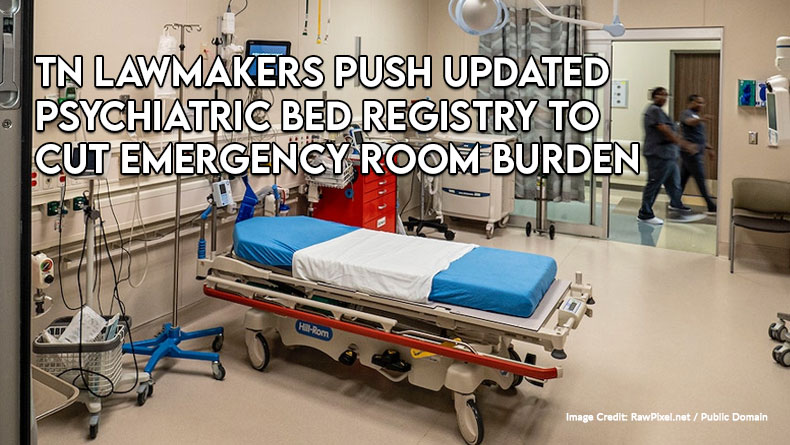Rep. Sparks urges action before another mass shooting takes place.
Image Credit: RawPixel.net / Public Domain
By Sam Stockard [Tennessee Lookout -CC BY-NC-ND 4.0] –
Amid the debate over mental health care versus gun control, two Rutherford County lawmakers are hoping to improve the flow of mentally unstable patients to psychiatric hospitals from emergency rooms.
House Bill 827 sponsored by Rep. Mike Sparks, R-Smyrna, and Sen. Shane Reeves, R-Murfreesboro, would require psychiatric hospitals to make daily updates to the state’s bed tracking system for children, adults and seniors beginning in January 2025.

The bill ran into opposition this year and was postponed until 2024 in the House Health Committee even though the Senate Commerce and Labor Committee passed the measure 9-0 and sent it to be scheduled for consideration on the Senate floor.
In advance of an Aug. 21 special session designed to deal with mass shootings such as the killing of six people at The Covenant School in Nashville, lawmakers are debating the need for gun-law reform as opposed to mental health treatment. Sparks contends now is the time to make sure people are getting into psychiatric hospitals before they do something rash.
He further contends that campaign finance donations are a factor in the Legislature’s refusal to pass the bill.
“If lobbyists and money is blocking mental health and blocking patients and it’s going to be a threat to the next school shooting, then this sh– needs to be called out,” Sparks says.
The Tennessee Hospital Association wields considerable influence in the Legislature, spending $7.75 million on lobbying expenses and campaign donations since 2009, third most in the state, according to a Tennessee Lookout analysis.
Reeves calls the bill a small step toward improving treatment for mental health patients.
“Tennessee’s hospitals and their emergency rooms are just not equipped to handle people that are being admitted with mental health crises. These folks are showing up with depression and anxiety and schizophrenia and suicidal ideation, and they’re just not equipped to house these folks,” Reeves says.
Improving the reporting system to let emergency room doctors know how many psychiatric beds are available in a certain region of the state can help shift the burden from hospitals, the lawmakers say.
Reeves acknowledges a hospital ER could call a local psychiatric ward to see if it has a bed available, but he points out doctors can save time by using the same updated database to track those openings.
A bigger problem, Reeves says, is that there aren’t enough psychiatric beds in the state to handle the patient load. But he says facilities are being constructed across the state.

Tennessee has 23 hospitals licensed to treat mental health problems with 2,126 beds, 1,765 of which are staffed, according to the Department of Health.
Mental health advocates contend that updating the tracking system takes about two minutes a day. They point out many of the state’s psychiatric hospitals are filling out the registry daily but that many go weeks and even years without providing updates.
The state’s four mental health hospitals update the portal daily, officials say.
Suzanne Blackwood, a licensed professional counselor and director of the Hope Center of Cannon County in Woodbury, told lawmakers this year the bill is designed to deal with the problem of emergency room “boarding” in which patients with psychiatric problems are having to spend days and weeks in the emergency room because physicians can’t find a psychiatric hospital to take them.
“It’s not OK. This is happening throughout Tennessee. This is happening nationwide. It’s even happening internationally,” Blackwood says.
Elliot Pinsly, president and CEO of the Behavioral Health Foundation, testified before the House Health Committee about the importance of forcing psychiatric hospitals to put fresh information into the system daily since some haven’t updated since 2020.
“That is meaningless data at that point,” he says.
The Tennessee Department of Health created the Healthcare Resource Tracking System in 2006 as part of the state’s emergency preparedness plan and added psychiatric hospitals to that in 2018 at the request of the Department of Mental Health and Substance Abuse. A year later, the state received a federal grant to make the system’s data more reliable and add a separate patient bed matching system to allow referrals to be made directly to hospitals.
The state urged psychiatric hospitals last year to update the system, but advocates say emergency department crowding is growing worse.
“Asking is not enough. There needs to be some sort of mandate to get everybody on board because the private hospitals are not wanting to do this, and it’s complicated,” Pinsly says.
Sparks says his “fear” is that some hospitals are refusing to update the portal because they want to cherry-pick patients for financial purposes.
“My gut tells me that,” Sparks says.

The Tennessee Hospital Association denies that some psychiatric hospitals withhold figures because they want to limit referrals to patients who are insured and capable of paying.
An official with TrustPoint in Murfreesboro testified before the House Health Committee in early April, saying the bill has good intentions but pointing out that having an open bed doesn’t mean the facility is capable of providing the care for a patient.
Beth Goodner, CEO of TrustPoint, told the committee the problem is “staffing” the beds, including having enough nurses and patient technicians as well as the correct type of care or bed for the patient.
The Tennessee Hospital Association declined to support the measure because it posed “operational and workforce challenges.”
“THA supports the concept of a tracking tool that would improve prompt access to inpatient psychiatric hospital care but had concerns with the details of the plan that was proposed last legislative session. We will continue to be productively engaged in future discussions regarding this issue,” Zack Blair, THA senior director of advocacy, said in a statement.


About the Author: Sam Stockard is a veteran Tennessee reporter and editor, having written for the Daily News Journal in Murfreesboro, where he served as lead editor when the paper won an award for being the state’s best Sunday newspaper two years in a row. He has led the Capitol Hill bureau for The Daily Memphian. His awards include Best Single Editorial from the Tennessee Press Association. Follow Stockard on Twitter @StockardSam


